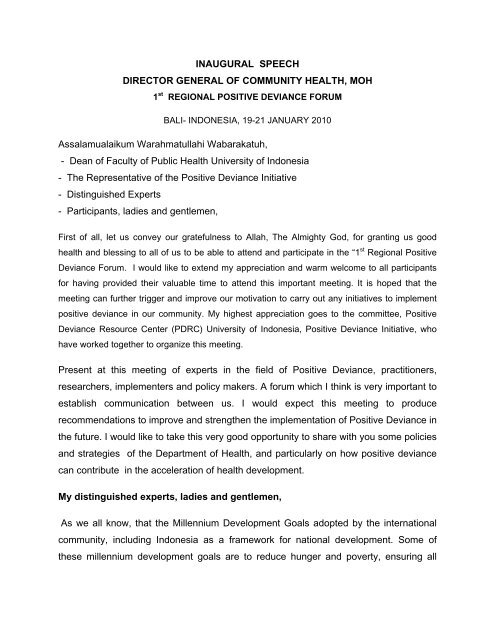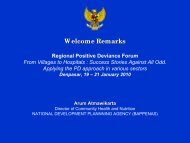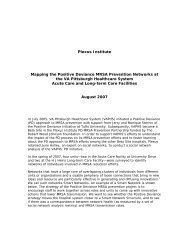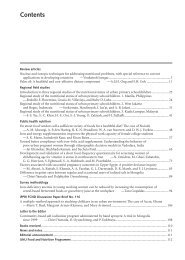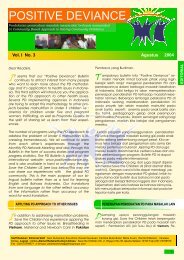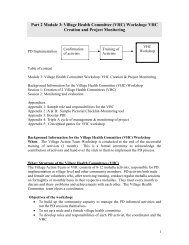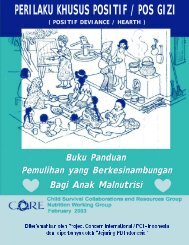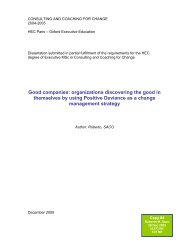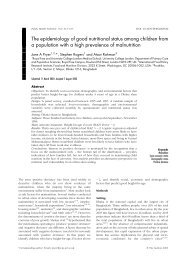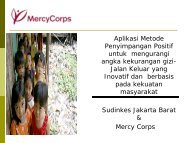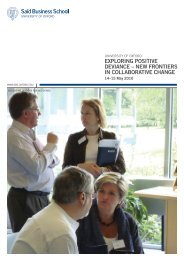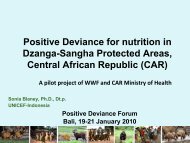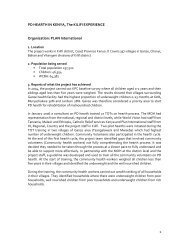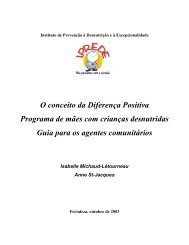INAUGURAL SPEECH DIRECTOR GENERAL OF COMMUNITY HEALTH, MOH ...
INAUGURAL SPEECH DIRECTOR GENERAL OF COMMUNITY HEALTH, MOH ...
INAUGURAL SPEECH DIRECTOR GENERAL OF COMMUNITY HEALTH, MOH ...
Create successful ePaper yourself
Turn your PDF publications into a flip-book with our unique Google optimized e-Paper software.
<strong>INAUGURAL</strong> <strong>SPEECH</strong><br />
<strong>DIRECTOR</strong> <strong>GENERAL</strong> <strong>OF</strong> <strong>COMMUNITY</strong> <strong>HEALTH</strong>, <strong>MOH</strong><br />
1 st REGIONAL POSITIVE DEVIANCE FORUM<br />
BALI- INDONESIA, 19-21 JANUARY 2010<br />
Assalamualaikum Warahmatullahi Wabarakatuh,<br />
- Dean of Faculty of Public Health University of Indonesia<br />
- The Representative of the Positive Deviance Initiative<br />
- Distinguished Experts<br />
- Participants, ladies and gentlemen,<br />
First of all, let us convey our gratefulness to Allah, The Almighty God, for granting us good<br />
health and blessing to all of us to be able to attend and participate in the “1 st Regional Positive<br />
Deviance Forum. I would like to extend my appreciation and warm welcome to all participants<br />
for having provided their valuable time to attend this important meeting. It is hoped that the<br />
meeting can further trigger and improve our motivation to carry out any initiatives to implement<br />
positive deviance in our community. My highest appreciation goes to the committee, Positive<br />
Deviance Resource Center (PDRC) University of Indonesia, Positive Deviance Initiative, who<br />
have worked together to organize this meeting.<br />
Present at this meeting of experts in the field of Positive Deviance, practitioners,<br />
researchers, implementers and policy makers. A forum which I think is very important to<br />
establish communication between us. I would expect this meeting to produce<br />
recommendations to improve and strengthen the implementation of Positive Deviance in<br />
the future. I would like to take this very good opportunity to share with you some policies<br />
and strategies of the Department of Health, and particularly on how positive deviance<br />
can contribute in the acceleration of health development.<br />
My distinguished experts, ladies and gentlemen,<br />
As we all know, that the Millennium Development Goals adopted by the international<br />
community, including Indonesia as a framework for national development. Some of<br />
these millennium development goals are to reduce hunger and poverty, ensuring all
children to complete primary education, eliminating gender disparity at all levels of<br />
education, and reduce infant and child mortality and maternal mortality.<br />
Health development in Indonesia in the last three decades shows an encouraging<br />
progresses. Health Statistics 2007 showed that Life Expectancy at birth had increased<br />
to 70.5 years, Maternal Mortality Rate (MMR) dropped to 228 per 100,000 live births,<br />
and Infant Mortality Rate (IMR) fell down to 34 per 1,000 live births. At the same time,<br />
the prevalence of under-nutrition among under-five has decreased to 18.4%.<br />
There has been a disparity in the achievement of health development. Some regions<br />
have shown encouraging results, several other the progresses is very slow. There are<br />
gaps in health status, gap between regions, between the level of education, socioeconomic,<br />
rural and urban. As an illustration, the prevalence of malnutrition in<br />
Yogyakarta is below 15%, but in East Nusa Tenggara province is still above 30%. Infant<br />
mortality in low educated mothers is 3 times higher than the highly educated mothers.<br />
Infant mortality rate in a low socioeconomic group is greater than those higher economic<br />
level.<br />
There are unfavorable habits that contribute to the health and nutrition status of<br />
children. For example; The prevalence of wasting and overweight among under-five in<br />
poor families (quintile 1 and 2) no different from the relatively wealthy families (quintile 4<br />
and 5). Habits of the mothers introduced complementary feeding early (before the 6-<br />
month-old), personnel and environmental hygiene have contributed to the health and<br />
nutrition status of children; The mothers prefer get birth at home because they feel more<br />
relaxed in their own environment.<br />
Ladies and gentlemen,<br />
Recognizing the role of social determinants such as socio-economic, cultural and<br />
environment, Ministry of Health put the community empowerment as one of the main<br />
strategies of health development. In the Strategic Plan 2010-2014 explicitly mentioned<br />
that one of the key strategies to improve health and nutrition status is promote
community empowerment, private sector and civil society in health development<br />
through national and global cooperation.<br />
The concept of community empowerment is basically efforts to improve the ability<br />
(capacity) of people to be able to prevent and cope with health problems. Communities<br />
are assisted and given the ability to assess their own health problems (Assessment),<br />
given the ability to analyze and develop prevention plans (Analysis) and given the ability<br />
to how to carry out activities, community mobilization, monitoring and assessment<br />
(Action). The concept is often called as educative approach, that consists of Village<br />
Level Meeting, Community Self Survey (CSS) and the Village Community Meeting.<br />
The real form of the community empowerment is the introduction of Desa Siaga and<br />
Integrated Service Post (Posyandu). Desa Siaga is a village where people have the<br />
willingness and ability to prevent and overcome threats and health problems. Therefore<br />
I expect that all community development activities in the field of health at the village<br />
level should in line with Desa Siaga. In the Desa Siaga, Posyandu must properly<br />
functioned. Our target is that all villages should become Desa Siaga, and all infants and<br />
under-five are reached by Posyandus.<br />
At this time, the Ministry of Health also piloting a model of community empowerment in<br />
the field of nutrition, through the Nutrition Improvement Project through Community<br />
Empowerment. The focus of this project is to increase the capacity of communities<br />
through Community Nutrition Groups, through the facilitation and provision of<br />
community nutrition package.<br />
Distinguished Ladies and Gentlemen,<br />
Positive Deviance as a concept and theory is not something new, it has been<br />
introduced since the 1970s. Positive Deviance originated from the belief that in society<br />
there are some individuals who have "behavior and/or specific efforts" to enable them<br />
better than the others. "Those behavior or/and specific efforts" is basically a solution.<br />
So, when a certain behavior and efforts identified the next attempt is to teach behaviors<br />
and particular efforts to the surrounding community members.
In the implementation is not easy. Several trials on a small scale Positive Deviance<br />
reportedly very successful, could change the behavior of community members in<br />
meaningful and sustainable. But in a broader scale, the application of Positive Deviance<br />
often meet with failure. Positive Deviance requires several conditions, such as<br />
professional assistants. This is also the things that need to be discussed at this forum.<br />
My distinguished participants, ladies and gentlemen,<br />
I do hope that this forum could discuss and come up with recommendation on the<br />
development and the application of Positive Deviance in various aspects. In this<br />
regional forum is expected to occur an exchange of experience and success and failure<br />
stories in the application Positive Deviance in various countries. It will be very useful in<br />
finding solutions to challenges and problems we face. I hope this forum can foster new<br />
ideas that can be adapted to local conditions.<br />
Once again, thank you very much to the committee, PDRC FKM-UI, Positive Deviance<br />
Initiative, UNICEF, the donors, NGOs, experts and participants for their participation in<br />
this forum.<br />
Finally, I declare that the 1 st<br />
Regional Positive Deviance Forum officially opened.<br />
Wassalamualaikum Warahmatullahi Wabarakatuh<br />
Director General of Community Health<br />
Dr. Budihardja, DTM & H, MPH


